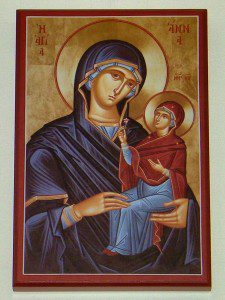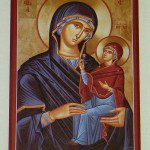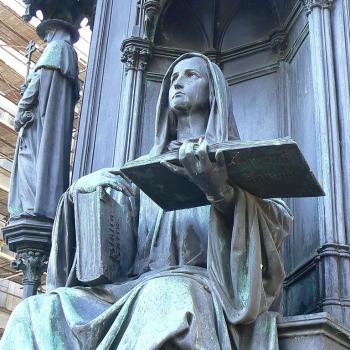
This is the fifth part of a series reflecting on Mary as Panagia, the All Holy One. Click here for Part I , click here for Part II, click here for Part III, and click here for Part IV.
The importance of Israel, why its destiny could be embraced as having universal significance, lies in the fact that God chose Israel to be the place in which he worked with humanity, to purify it and prepare it for the incarnation. A pure humanity which freely gave itself over to God was needed to be in place so that the Son of God could take that gift and assume it unto himself. It was in Israel that God chose to heal the harm done by sin and re-establish the original face of humanity represented by Adam and Eve. And, as we have seen, though Israel became the stage for God’s action, he chose from amongst all the people within it the line of David to be the root from which Christ was to be born. Jesus was the goal, the beautiful flower which emerged from the Tree of Jesse. The humanity of Jesus was not produced ex nihilo, but rather, was slowly prepared by God, allowed to be a true humanity connected with the rest of us. Just as Jesus was the goal, his mother, Mary, was also required by God to be brought forth in the world, free from sin, so that she could hand over a pure humanity to her son, Jesus.[1] Thus, Mary was also an object of prophecy and was given her role by God, predestined to be the source of the God-man’s humanity. God had pre-chosen her, that is, knew her from his eternity, and saw she would freely accept him and the task he gave to her, so that he helped prepare the world for her, building her up through the ages to be a temple which he could inhabit:
The Father predestined her, and the prophets spoke of her through the Holy Spirit. The sanctifying power of the Spirit reposed on her, cleansed her and made her holy; in a certain sense, he fertilized her in advance. Then you, the Father’s self-defining Word, dwelt in her without being limited, summoning the farthest reaches of our nature up to the endless heights of your incomprehensible divinity.[2]
The prophets spoke of her and her destiny: they spoke of the virgin who shall conceive the God-man. She was foreseen next to her son, the Son of God; their destinies were intertwined from eternity and revealed, in part, to Israel through the work of the Holy Spirit speaking in the prophets. Clearly, Jesus’ role is greater than the one planned for Mary, because he is the God-man sent to save and deify us, yet, apart from him, she has the most significant place in salvation history. It was her humanity which was taken into Christ and made his own. It was her blood which became his own, a blood which would have to be pure and without stain for it to be taken in by him and become his. And, even after his birth, she fed him her milk produced from her blood: he who was the bread of life was intricately connected with and nourished by the body and blood of his mother, Mary. His place in history was not established against the grain of God’s work with humanity, but as the end product of it. His birth came at the fullness of time, that is, when the integral purity of humanity had been reestablished, whereby it could then be taken up and deified in the hypostatic union.
The Holy Spirit was at work in history, working with her family line, making it so that she could be born ready to become the mother of the eternal Son in time. As Blessed Duns Scotus noted, she is saved by the mediation of her son by the fact God saved her from original sin, “for she would have contracted original sin by reason of her common birthright were she not prevented by the grace of her mediator, — and just as others would have a need for Christ that through his merits the sin they had already contracted be remitted, so she had an even greater need of a mediator lest she would need to contract it at sometime and to prevent her from contracting it.”[3] As the Holy Spirit is the bearer of grace, it the Spirit who worked with the remnant of Adam, worked through Israel, to produce the Theotokos. This was, therefore, the main purpose of the “Old Testament Church” of Israel:
This was in fact accomplished in the Most Pure Virgin Mary, whose appearance in the world was the main work of the Old Testament church. A hereditary holiness, assisted by the grace of the Holy Spirit, had accumulated for centuries and millennia in the Old Testament church; this holiness, tried by fate and temptations and formed by the entire gracious life of the Church, had ascended higher and higher above the level of fallen humanity. In this way, in its creaturely and human aspect, the Incarnation was prepared from ancient times by the inspirations of the Holy Spirit, the action of the Third hypostasis. The peak of this holiness was attained in the Most Holy Virgin, whose purity was such that She was “full of grace,” overshadowed even prior to the Incarnation by the constant illuminations of the Holy Spirit.[4]
When we say the Son was incarnate by the power of the Holy Spirit, we must look at this power as being at work, not just in the conception of Christ in Mary, but in the whole history of humanity. We find the pure human woman was slowly established by the grace of God, so that through her, the God-man could be formed. Her purity was a gift of God, a gift which can be seen directly given to her through the Holy Spirit, even as it was established in the work of Christ as the lamb slain from the foundation of the world (cf. Rev. 13:8). Her holiness and sanctification came from God. This is why she rejoices in God her savior: her purity is proof of what God had done to save her!
From what has been said, we have hopefully given answer to the first question which we wanted to address, that is, if Mary is full of grace and without sin, how can she say God is her savior. The answer is that it is in and through the work of God in history, preparing for her, instilling grace in humanity through his interaction with Israel, God has indeed saved her. Without God’s interactions with Israel, preparing the line of David for the incarnation, she would not have had the grace needed, not only for her personal purity, but also to be the Mother of God.
More to Come
[1] For God the Son to assume humanity unto himself, the humanity would have to be pure, to have nothing in it which would oppose it to his Godhead.
[2] St John of Damascus, “Homily I on the Dormition” in On the Dormition of Mary: Early Patristic Homilies. trans. Brian E. Daley, S.J. (Crestwood, NY: St Vladimir’s Seminary Press, 1998), 185.
[3] John Duns Scotus, Four Questions on Mary. trans. Allan B. Wolter, O.F.M. (Saint Bonaventure, New York: Franciscan Institute Publications, 2012), 63.
[4] Sergius Bulgakov, The Lamb of God. trans. Boris Jakim (Grand Rapids, MI: William B Eerdman’s Publishing Company, 2008), 178.
Stay in touch! Like A Little Bit of Nothing on Facebook:
A Little Bit of Nothing














